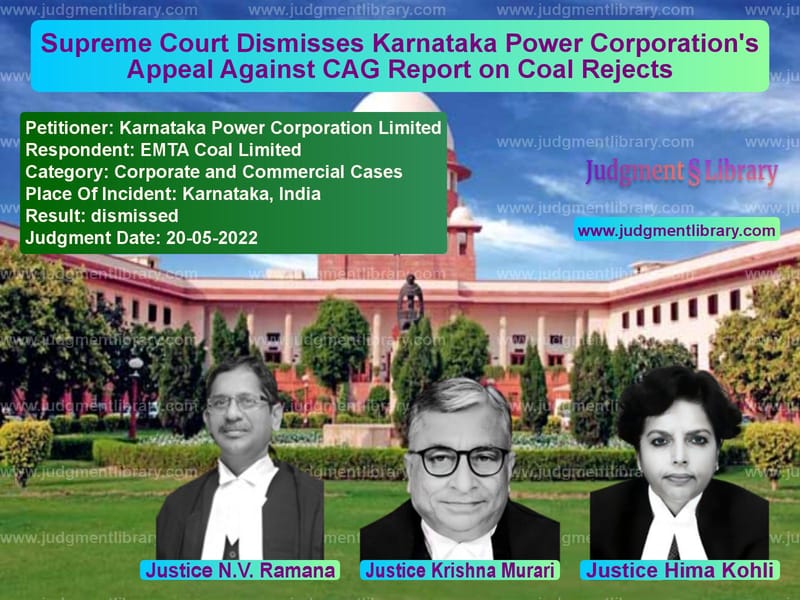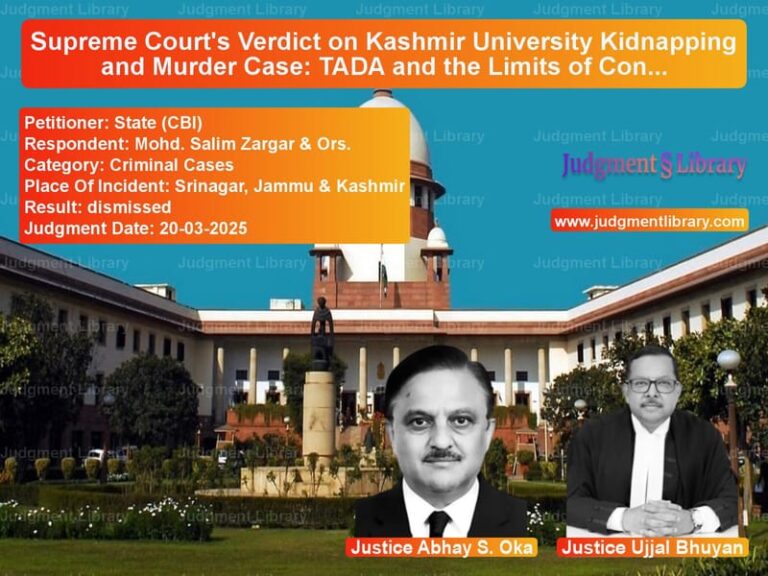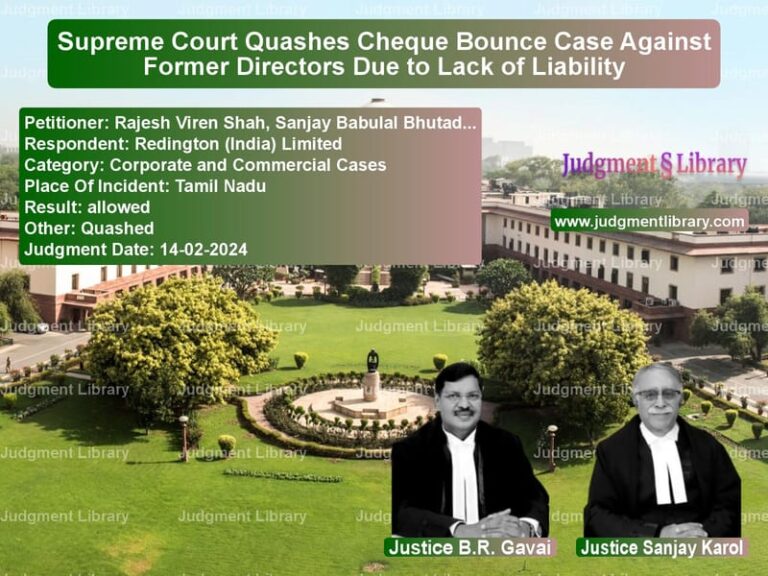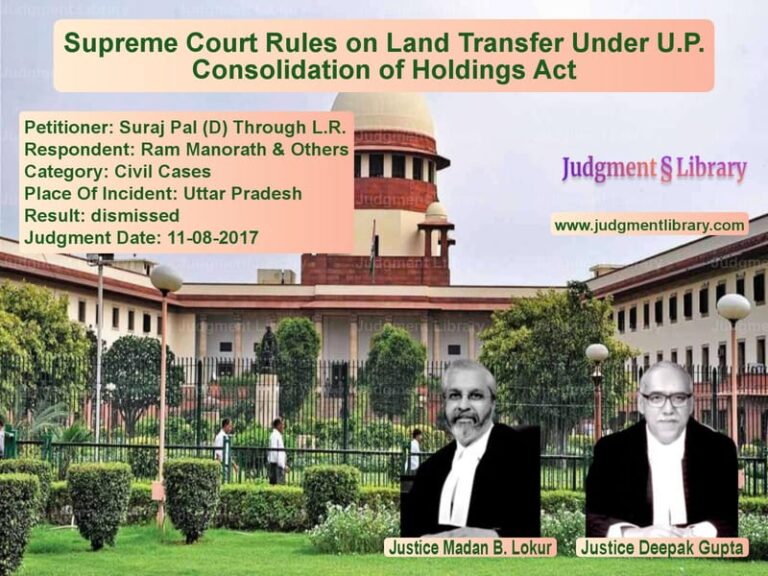Supreme Court Dismisses Karnataka Power Corporation’s Appeal Against CAG Report on Coal Rejects
The case of Karnataka Power Corporation Limited vs. EMTA Coal Limited & Anr. centers on the long-running dispute between the Karnataka Power Corporation (KPC) and EMTA Coal Limited over the procurement and supply of coal for the thermal power projects in the State of Karnataka. The dispute was triggered by a report from the Comptroller and Auditor General (CAG) that raised concerns regarding the quantification of coal rejects. The Supreme Court, after hearing the parties, dismissed the appeal filed by KPC and upheld the High Court’s decision, which favored EMTA Coal Limited in the matter of coal procurement and reimbursement of washing charges.
Background of the Case
In 2002, KPC entered into a joint venture agreement with EMTA Coal Limited for the development of coal mines and supply of coal to power plants under KPC’s thermal power projects in Karnataka. The coal was to be used as a captive source for generating power at the plants. The Comptroller and Auditor General (CAG) conducted a performance audit for the year ending March 2013 and identified discrepancies in the coal procurement process, particularly related to the coal rejects.
The CAG report observed that a minimum quantity of coal rejects, which were not usable, should be at least 10% of the total coal production. Based on this report, KPC demanded a reimbursement of Rs. 52.37 crores from EMTA Coal Limited for the coal rejects. However, EMTA challenged this claim, stating that the deductions made were not justified and there were no specifications in the agreement regarding how washing charges should be treated.
In 2016, EMTA filed writ petitions before the High Court of Karnataka, challenging the recovery demand raised by KPC based on the CAG report. The High Court ruled in favor of EMTA, stating that KPC could not recover the amount solely based on the CAG report and that the respondents were entitled to receive reimbursements for the deductions made.
Key Legal Issues
- Whether the High Court erred in holding that KPC could not recover amounts from EMTA based solely on the CAG report.
- Whether the deductions made by KPC for washing charges were justified under the agreements between the parties.
- Whether the recovery of Rs. 52.37 crores, based on the CAG report, was legally valid without specific agreement provisions.
- Whether the High Court properly exercised its discretion in entertaining writ petitions in contractual disputes between state instrumentalities and private parties.
Arguments Presented
Petitioner’s Arguments (Karnataka Power Corporation Limited)
- The CAG report indicated that a minimum of 10% rejects from coal production was necessary and that EMTA’s failure to ensure this led to the dispute.
- The deductions made for washing charges were based on a reasonable interpretation of the CAG audit report.
- The recovery demand of Rs. 52.37 crores was justified, and the respondents should have complied with the payment.
- The High Court had erred in accepting EMTA’s claims without considering the audit findings and the significance of the washing charges in the context of the joint venture agreement.
Respondents’ Arguments (EMTA Coal Limited)
- There were no provisions in the agreement that allowed KPC to make deductions for washing charges or the quantity of coal rejects.
- The CAG report’s calculations were based on assumptions and not factual errors, making it irrelevant to the dispute between the parties.
- The deductions for washing charges made by KPC were arbitrary and unsupported by any specific terms in the agreement.
- The claim for reimbursement of Rs. 52.37 crores was baseless and unjustified, and the High Court correctly ruled in EMTA’s favor.
Supreme Court’s Observations
The Supreme Court critically analyzed the CAG report, the agreements between the parties, and the findings of the High Court. The key observations included:
- Discrepancies in the CAG report: The Court noted that the CAG’s findings were based on estimations rather than verifiable data and could not be the sole basis for monetary deductions or claims.
- Inadequate specification in agreements: The agreements between KPC and EMTA did not provide sufficient clarity on the issue of coal rejects and washing charges, making KPC’s deductions arbitrary.
- Absence of clarity on washing charges: The agreements did not specify how coal washing should be quantified or priced, and KPC failed to provide evidence that EMTA had breached the terms of the joint venture.
- The High Court’s discretion was valid: The Court upheld the High Court’s decision to entertain the writ petitions, especially in contractual disputes between state instrumentalities and private entities.
Key Excerpts from the Judgment
The Supreme Court ruled:
“In the absence of any specific agreement provisions regarding washing charges, the deductions made by KPC were arbitrary and unjustified.”
The Court further observed:
“The audit report by the CAG, though a valuable tool for checking transparency, cannot serve as the sole basis for deciding contractual disputes. It must be supported by clear evidence and agreement provisions.”
Final Verdict
The Supreme Court dismissed the appeal filed by Karnataka Power Corporation Limited, and the following decisions were made:
- The High Court’s ruling favoring EMTA was upheld.
- The appeal by KPC for reimbursement of Rs. 52.37 crores was rejected.
- The respondents were entitled to reimbursements for any arbitrary deductions made by KPC from their payments.
Outcome: The ruling emphasizes the need for clear contractual provisions in business agreements and the limited role of audit reports in resolving commercial disputes. The Court reinforced the principle that judicial review in contractual disputes should be based on established legal norms and clear evidence rather than speculative reports.
Petitioner Name: Karnataka Power Corporation Limited.Respondent Name: EMTA Coal Limited.Judgment By: Justice N.V. Ramana, Justice Krishna Murari, Justice Hima Kohli.Place Of Incident: Karnataka, India.Judgment Date: 20-05-2022.
Don’t miss out on the full details! Download the complete judgment in PDF format below and gain valuable insights instantly!
Download Judgment: karnataka-power-corp-vs-emta-coal-limited-supreme-court-of-india-judgment-dated-20-05-2022.pdf
Directly Download Judgment: Directly download this Judgment
See all petitions in unfair trade practices
See all petitions in Corporate Compliance
See all petitions in Company Law
See all petitions in Judgment by N.V. Ramana
See all petitions in Judgment by Krishna Murari
See all petitions in Judgment by Hima Kohli
See all petitions in dismissed
See all petitions in supreme court of India judgments May 2022
See all petitions in 2022 judgments
See all posts in Corporate and Commercial Cases Category
See all allowed petitions in Corporate and Commercial Cases Category
See all Dismissed petitions in Corporate and Commercial Cases Category
See all partially allowed petitions in Corporate and Commercial Cases Category







